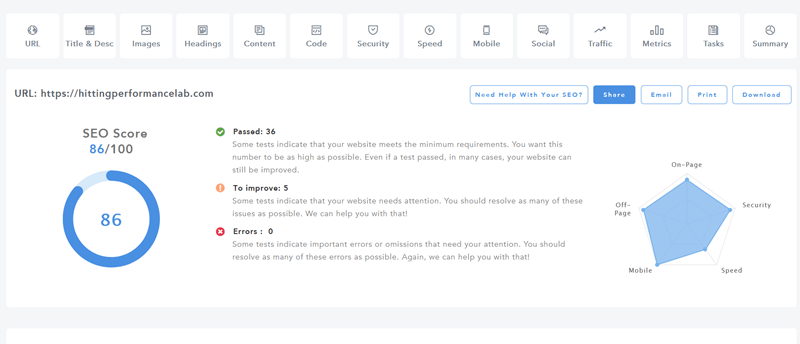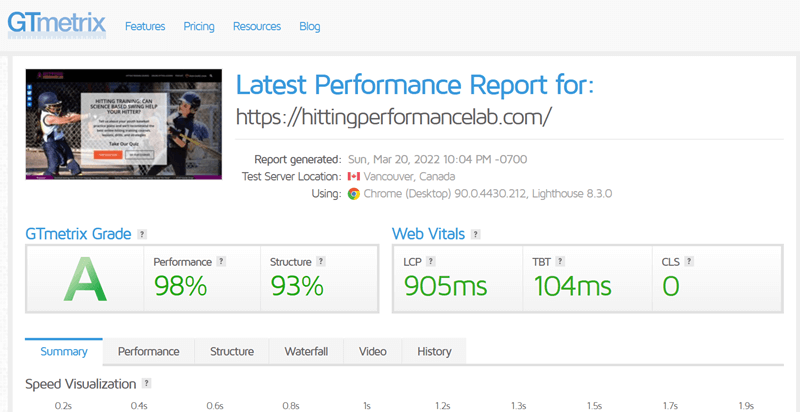Get the best FREE no-hassle website SEO audit report using our automatic report generator tool for small businesses, Ecommerce stores, and Real Estate company sites. When it comes to an SEO audit, this article includes the benefits of, what is include in, and a checklist for your reference…
In this article, we’ll go over why an SEO audit is important for a website.
As you’ll discover below, SEO auditing is a comprehensive analysis of on-page activities that allow you to assess the health and performance of your website.
In digital marketing, the importance of doing an SEO audit can’t be stressed enough.
This process can help you uncover potential technical problems with your site that may be restricting search engines from crawling your web pages or understanding your content to effectively index and rank it on Google, Yahoo, or Bing.
So let’s dig into why SEO auditing is important as well as what types of issues you should be looking for to improve the search engine visibility for your website.

Why An SEO Audit Is Important
An SEO audit is important for identifying the strengths, weaknesses, and potential impacts of technical SEO issues that can affect your website’s rankings and traffic. SEO audits are important to schedule regularly in order to achieve long-term success for your website’s performance.
What Is An SEO Audit?
An SEO audit is a form of website maintenance, similar to the maintenance you do on a car.
Every car owner knows maintenance is important. Every now and then, you take the car to the garage and let the mechanic have a look under the hood. He checks if everything is ok, and might change the oil or replace the brakes. Your car drives just a bit better after a service.
An on-page SEO audit is just like that, but for your website.
During an SEO audit, you’ll evaluate all the parts of the website that are important for SEO; think of items like index-ability, meta descriptions, titles, and page speed.
You’ll find some technical SEO and on-page SEO issues and make the required changes, and just like your car, your website now performs better.
Overall, an SEO audit is a great way to start a new SEO project, prioritize your technical backlog, and keep track of progress.
Why You Should Include SEO Audits In Your Important Projects
For every SEO audit, the goal is to improve the organic performance of a website.
Here are some ways to achieve that:
Find Issues
Without the right technical foundation for your site, you can create content and build links (for off-page SEO optimization), but it won’t matter.
Here’s an extreme example:
The site owner doesn’t know the developer accidentally set all the pages to noindex. The site gets less and less traffic from Google until it’s completely gone from the search engine results pages (SERPs). The site just lost 50% of all its traffic.
Now here’s a more common example that’s seen quite often:
URLs may change, causing broken links on your site. Or meta descriptions aren’t unique and descriptive, causing a lower CTR in Google.
Issues like this can be prevented by running an SEO audit on a regular basis. You’ll find issues before they affect your performance, with plenty of time left to fix them.
Of course, not all issues will have such a big effect on your performance. But many minor issues combined can still add up to a significant hit in search traffic. An SEO audit helps you find and fix these issues.
Setting Priorities
An SEO audit is more than a long list of issues. A good audit also includes prioritization. Your content team or developers have limited capacity, so it’s important to decide what is the most impactful improvement.
You’ll want to go after the low-hanging fruit: changes that can be implemented quickly but still have a big impact on your organic visibility. Start with those changes, and work down the list from there.
An SEO audit helps you determine the priorities because it gives you an overview of all the issues, and how many pages are affected by them.
Track Progress
After setting the priorities, you can keep track of how your site is improving by running a regular SEO audit. As things get fixed, your to-do list should get smaller, the site audit score should improve, and eventually, your rankings should go up.
Bonus: Keep an Eye On Your Competitors
So far we’ve talked about running an SEO on your own site or running one for a client. But why not run a technical audit on your competitor’s website?
It will help you get an idea of where you stand vs your competition. Also, it can help you find out why they rank better for important keywords.
On top of that, you may get some good ideas for new content or features.
What to Include In Your SEO Audit?
Every SEO specialist will have a slightly different opinion about what to include in an SEO audit, but most will agree that these are important things to check during an audit:
- Index-ability: can Google crawl and index every page?
- Site structure: is the site structured in a logical way
- Sitemaps: does the site have a sitemap with all the relevant URLs?
- Meta descriptions and page titles: does every page have a meaningful and unique page title and meta description, that gets people to click?
- Canonical URLs: does every page have a self-referring canonical URL
- Images: do all images have relevant alt text?
- Hreflangs: if you’re running an international website, do the hreflang tags point to the right pages?
- Broken links and redirects: do all the links on the page work, without being redirected first?
- Internal linking: does every relevant page have sufficient internal links?
- Page speed: does every page load fast enough to ensure a good user experience?
- Structured data: is there structured data on every page, if relevant (products, blogs, etc)?
This should give you an idea of what to include. Depending on the specific website you’re auditing, you may want to include more items.
This article focuses mainly on on-page SEO: the state of the website itself. You could even do a broader SEO audit that includes backlinks, keyword performance, and performance of organic traffic.
When to Do An SEO Audit?
At the Start of a Project
When you’re starting your own new project or you’ve landed a new project with a client, it’s a good idea to start with an SEO audit.
It will help you quickly understand the status of the website, and you’ll see what the biggest pain points are. And by finding the low-hanging fruit and getting important issues fixed, you can make a great first impression.
After Launching a New Website
The whole team has been working on the new website for months. When it finally goes live, traffic drops to almost 0.
Wait, did someone change that canonical URL that pointed to the test server?
This is exactly why you should audit a new website before launching it.
Unlike a brand new car that doesn’t need service right away, a new website can already have significant issues. If you catch them before or right after the launch, you can prevent serious damage.
Weekly or Monthly
An SEO audit is not a one-time fix. New content gets added to your site and old content is removed. Technical changes get implemented. The site keeps changing. You need to stay on top of that. That’s why you need regular SEO audits.
Depending on how often changes are made, you should run a weekly or monthly check to catch relevant issues.
Some SEO audit tools like ours on our homepage (mentioned in the next section) can run an automated audit every week and email you the results.
After Big Changes or Migrations
Moving a site to a new content management system (CMS) or implementing major technical changes are good reasons to run a new SEO audit. URLs might have changed, links no longer work, or page speed may drop.
After Google Updates
Google update may shift the priorities for you as an SEO.
The Google Page Experience update caused many SEOs to pay extra attention to page speed and Core Web Vitals. These new priorities can be a good reason to run a new audit to make sure the site performs well on changing ranking factors.
How to Do An SEO Audit?
Start with the Right Tool
Doing an SEO audit manually might be doable if you have a small number of pages. But that quickly becomes impossible. Running a checklist of 20 items for every page will take weeks for larger websites.
Fortunately, SEO audit tools can automate this for you.
They’ll first crawl your website (finding all the pages), and then check every page for all things that are relevant for SEO. This will save you a lot of time: most audit tools can give you a meaningful report in under 30 minutes.
Our FREE audit is an online SEO tool that helps you quickly run an SEO audit and gives you a prioritized to-do list of things that need fixing. It also keeps track of your changes so you can monitor the overall health of your website or a client’s site over time.
Here’s a screenshot of how the dashboard looks:

Another well-known audit tool is GTMetrix…

Finally, other major tools like Ahrefs, Google PageSpeed score, or Semrush also include SEO or technical auditing capabilities but they’re not 100% dedicated to the task like ours is.
Interpret the Results and Prioritize Tasks
A wise man once said: a fool with a tool is still a fool.
Although you would not want to run an SEO audit without a tool, it is still your job as an SEO specialist to interpret the results and prioritize what needs fixing.
An SEO tool might find hundreds of issues, and you’ll have to determine which of those deserves your attention, and which can wait.
There are too many SEO consultants out there whose idea of an SEO audit is to send over a Screaming Frog report. That’s not helping anyone.
An SEO audit tool cannot replace an SEO specialist. The human touch is what makes an SEO audit great.
Implementing Changes
Depending on the project, you may be able to make the required improvements yourself or work with technical and content teams to get the changes implemented.
When working with others, it’s important to involve the other teams in the changes you require. By explaining the impact of the issues you want to fix, and discussing possible solutions, you’ll get a better end result in less time.
Follow Up
Have the changes been made? Great! Now let’s follow up. It’s time to run a new SEO audit to verify everything works as expected and to see if no new issues have been introduced.
If the improvements have been implemented correctly, it’s time to measure the impact and check if you see an uptake in organic traffic. Then it’s time to move to the next item of your SEO to-do list.
Importance of An SEO Audit Summary
An SEO audit is an important part of every SEO project. It helps you find and prioritize issues, and track the progress of your project. There are very useful SEO tools out there to help you do an audit in just a short amount of time.
A good SEO audit covers everything that’s relevant for SEO, like index-ability, page titles, meta descriptions, broken links, page speed, and more. It’s good practice to run an SEO audit on a regular basis – once a week for instance – to stay on top of new issues, and find problems before your organic performance is affected.
The post Why SEO Audit Is Important for A Website first appeared on SEO Chatter.
About Lead Generation SEO Services…
We are media and company growth strategy specialists. How we can help your business:



